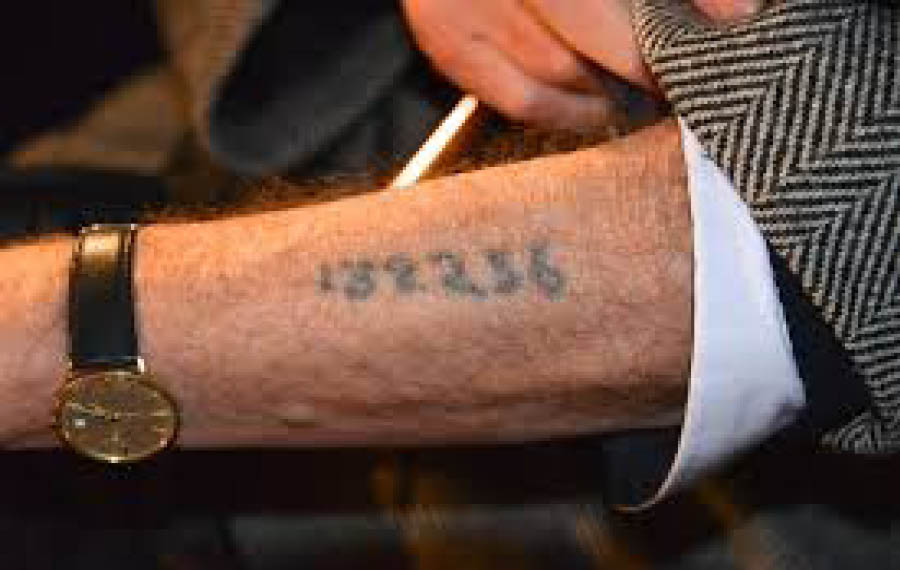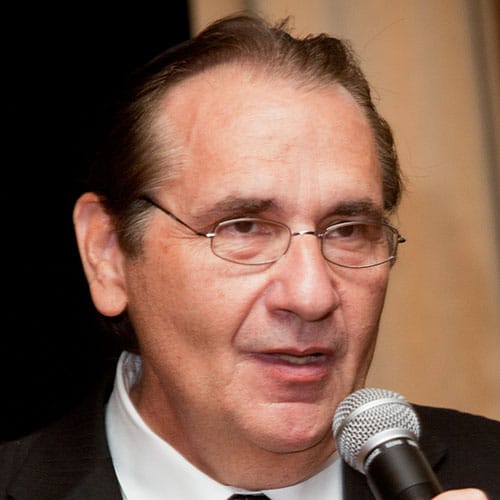 Photo by Wikimedia Commons.
Photo by Wikimedia Commons. I am not good with numbers. I barely made it through high school algebra. Yet there is one number I will never forget — a number with the letter “A” in front of it. A-6674. I will always remember it because I saw it every day until my mother died. It was tattooed on her left forearm.
The blue ink was etched into her flesh upon her arrival at Auschwitz. As is commonly known, the Nazis, being meticulous record keepers, kept track of inmates by branding their arms like cattle. It also was a method the Nazis used to dehumanize people. They wanted their prisoners to feel they no longer were individuals with names, homes, families and histories. They were just a number.
My mother was not a number. She was born Leah Katz and lived in Voloz, Czechoslovakia. She had parents, grandparents, uncles, aunts and three sisters, all Orthodox Jews. Her father was a baker and owned two bakeries. He supplied the town’s Jewish population with their bread, challah and cake. He worked hard and earned an honest living.
But it all came to an end when the Nazis marched into her town on the fifth day of Passover, 1944. She was a teenager. The Jews were shipped out in cattle cars. She never again saw any of her family members.
After spending months in two concentration camps, she was sent to Auschwitz. As she stared into the eyes of evil Joseph Mengele, he pointed right, sparing her life for the time being. Over the next number of months, she was assigned the gruesome task of searching through mounds of shoes to find matching pairs. They were the shoes left by fellow Jews who had gone to their deaths.
My mother was in Auschwitz for six months and became part of an exchange deal with Sweden. She and hundreds of other women were released before Auschwitz was liberated. Many didn’t make it, dying from disease or pure exhaustion. My mother spent two years in a Swedish hospital recovering from typhoid she had contracted while in Auschwitz.
After spending months in two concentration camps, she was sent to Auschwitz. As she stared into the eyes of evil Joseph Mengele, he pointed right, sparing her life for the time being.
With the help of the International Red Cross, she was able to locate an uncle who made it out before the war. He helped bring her to the United States to start a new life. She met and married my father and had two children. The happy family didn’t last long. My father died suddenly at a young age leaving my mother a 41-year-old widow with two teenage children to raise and support.
We moved to Los Angeles and she looked for work. The recently built Hillel Hebrew Academy needed someone to run its lunch room. My mother, being a master of the kitchen, created the lunch program in which she fed 170 students and faculty every day.
She was the hardest working person I have ever known. She rose at 5 a.m. every day and, after closing the lunchroom, went shopping for the next day’s meals. She did this for more than a decade and instead of complaining, was grateful for the job and having found a way to support us.
Those who endured the Holocaust aren’t called survivors for nothing. Yes, they miraculously survived the Nazi death machine. But then there was life after the war. Perhaps they emigrated to another country and had to learn a new language, find a job or create a business and build a family.
The world recently commemorated the 75th anniversary of the liberation of Auschwitz. World dignitaries gathered to make speeches and vow “Never again.” But we know all too well that history has a short memory.
For those who would deny the Holocaust happened, all they need do is look at the numbers on the arms of survivors. But time is running out. Every day that passes, eye- witnesses to the darkest period in world history are lost. Before too long, testimonies will be relegated exclusively to movies, films, books and online images.
The world needs to know and remember that those who survived the Holocaust were — and are — much more than a number.
Harvey Farr is a Los Angeles-based marketing consultant, writer and photographer.























 More news and opinions than at a Shabbat dinner, right in your inbox.
More news and opinions than at a Shabbat dinner, right in your inbox.